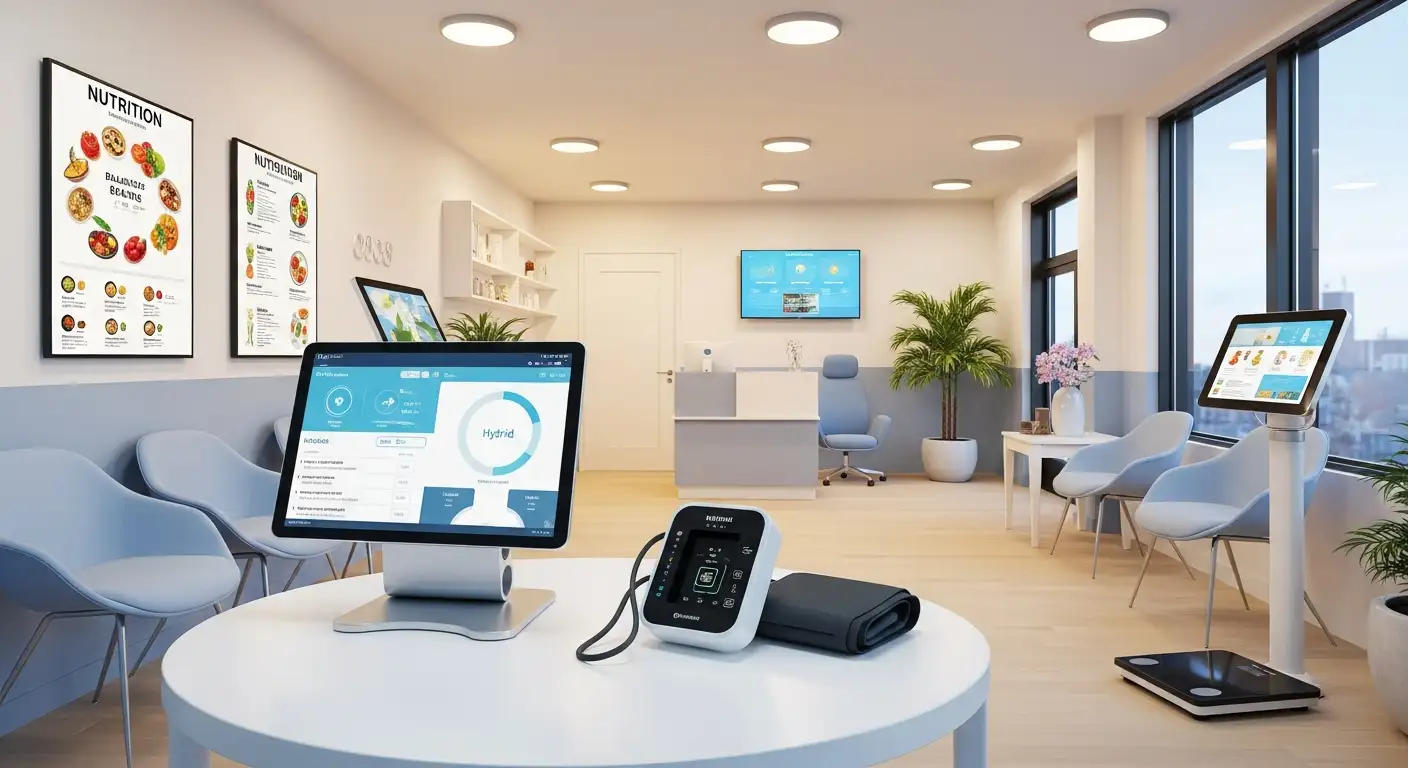How Hybrid Healthcare Improves Adherence to Long-Term Nutrition Plans

Introducing Hybrid Healthcare in Nutrition Management
As the prevalence of overweight and obesity continues to rise worldwide, sustaining adherence to long-term nutrition plans has become a critical challenge. Hybrid healthcare models, which integrate face-to-face interactions with digital health tools, are emerging as a promising solution to enhance engagement and effectiveness in weight management and wellness programs. This article explores how combining in-person and digital strategies improves adherence to nutrition plans, supports weight loss, and fosters sustained health benefits.
The Rise of Hybrid Healthcare in Weight Management
What are the most effective wellness programs for overall health?
Hybrid healthcare models represent a modern approach that integrates face-to-face healthcare with digital health tools, such as mobile apps, telehealth, and remote patient monitoring. This combination caters to a holistic wellness vision, targeting physical, mental, and emotional health simultaneously.
In weight management, hybrid models leverage initial in-person sessions followed by personalized digital follow-ups—through phone calls, texts, and apps—to motivate behavior change. This multifaceted approach enhances accessibility, especially for those facing geographical or logistical challenges.
Nutrition and exercise plans are personalized using behavior change theories like the Social Cognitive Theory, ensuring interventions are both evidence-based and adaptable. The inclusion of multidisciplinary teams—incorporating dietitians, psychologists, and exercise physiologists—further deepens support.
Comparative research shows hybrid programs achieve weight loss and health improvements on par with traditional exclusively face-to-face methods. For instance, studies report weight reductions ranging from 3.9 to 8.2 kg and improvements in BMI and waist circumference. Additional advantages include sustained engagement via digital monitoring and real-time feedback, promoting accountability and long-term success.
Thus, the most effective wellness programs harness the strengths of both in-person care and digital technology, delivering personalized, flexible, and continuous support that addresses comprehensive health needs.
Effectiveness of Hybrid Interventions on Weight and BMI
Weight Loss Outcomes
Hybrid weight management interventions that combine face-to-face sessions with digital tools have demonstrated notable effectiveness in promoting weight loss among overweight and obese adults. These programs typically initiate care with an in-person meeting and then leverage follow-ups through phone calls, text messaging, or dedicated apps. This approach facilitates gradual and continuous engagement, leading to average weight reductions between 3.9 and 8.2 kg. The personalized feedback and sustained monitoring are pivotal in supporting behavior change and adherence.
BMI Reduction
Alongside weight loss, hybrid interventions contribute to significant improvements in body mass index (BMI). Studies report an average decrease of about 0.58 kg/m², which reflects positive shifts in body composition and health risk factors. The integration of behavioral support based on social cognitive principles aids participants in making lifestyle changes that safely lower BMI over time.
Waist Circumference Improvements
Reductions in waist circumference have also been documented, with average decreases of approximately 2.25 cm. This measure is important as it correlates with reduced visceral fat and lower cardiometabolic risk. The hybrid model’s flexibility enables participants to maintain motivation and consistency in physical activity and dietary habits that target abdominal fat.
Physical Activity Increases
Participants tend to increase their physical activity levels through hybrid programs, leveraging digital tools for tracking and encouragement. Such improvements enhance overall energy expenditure and contribute to sustainable weight loss and health benefits.
How Can Weight Loss Be Achieved Safely and Sustainably?
Safe and sustainable weight loss is facilitated through gradual lifestyle changes supported by hybrid interventions that deliver balanced nutrition, exercise guidance, and continuous behavioral feedback. This structured support helps individuals avoid rapid, unhealthy weight loss and promotes long-lasting habits. The combination of in-person and digital engagement ensures ongoing motivation and accountability, which are crucial for maintaining progress and preventing relapse.
Initial Face-to-Face Engagement Enhances Digital Follow-Ups

Importance of the initial face-to-face session
Hybrid weight management programs commonly begin with an in-person session. This initial meeting establishes trust, allows personalized goal setting, and helps healthcare providers tailor interventions to individual needs. It sets a foundation for ongoing support and commitment, which participants find motivating.
Facilitating behavior change through digital follow-up
After the face-to-face meeting, digital tools take center stage for continuous engagement. Regular follow-up via phone calls, text messages, or mobile health apps supports behavior change by providing reminders, encouragement, and monitoring progress. The digital follow-ups help maintain accountability and adapt strategies as needed to enhance outcomes.
Common digital tools used
Among the digital tools employed, mobile apps are popular for tracking diet, exercise, and weight. Text messaging delivers timely prompts and motivational messages. Phone calls offer personalized feedback and problem-solving opportunities. Together, these tools create a flexible, convenient, and sustained support system that participants appreciate in overcoming barriers like distance or scheduling conflicts.
Patient Preferences: Accessibility and Convenience of Hybrid Models
Overcoming Geographic and Logistic Barriers
Hybrid weight management interventions combine face-to-face sessions with digital health tools such as phone calls, text messaging, and mobile apps. This combination effectively addresses geographic and logistic barriers that often limit access to traditional in-person care. Participants in these programs benefit from reduced travel needs and flexible scheduling, making it easier to stay engaged regardless of location or time constraints.
Increased Participant Satisfaction
Studies demonstrate that patients favor hybrid models because of the balance they offer between personalized in-person interactions and the convenience of digital follow-ups. This format fosters consistent support and engagement, which participants cited as enhancing their motivation and accountability. Many participants reported that the hybrid approach improved their satisfaction by providing continuous feedback and accessible resources.
Flexibility and Convenience Benefits
The hybrid care model offers notable flexibility by enabling patients to participate in weight management programs from home while still receiving professional guidance. This convenience supports sustained lifestyle changes by fitting into varied daily routines without sacrificing the quality of care. Moreover, using digital tools allows for timely communication with healthcare providers, further supporting adherence and ongoing behavioral change.
Overall, hybrid models' accessibility, flexibility, and supportive environment contribute to greater patient acceptance and long-term engagement in weight management programs.
The Role of Personalized Feedback in Improving Weight Loss Outcomes
How Do Digital Feedback Mechanisms Support Weight Loss?
Digital health tools such as mobile apps, text messaging, and phone calls provide a dynamic platform for delivering personalized feedback to individuals managing their weight. These mechanisms allow real-time monitoring and immediate response to patients’ progress, creating a continuous communication loop that fosters engagement.
For example, apps integrated within hybrid care models track metrics like weight, physical activity, and dietary habits. This data enables healthcare providers to tailor advice and interventions promptly, helping patients stay aligned with their goals.
In What Ways Does Behavioral Support Enhance Motivation?
Personalized feedback is crucial in reinforcing positive behaviors and motivating individuals. Continuous digital interaction offers encouragement, accountability, and timely reminders, all of which bolster the adoption of healthy habits.
Behavioral support strategies embedded within digital platforms, often grounded in theories like the Social Cognitive Theory, improve self-efficacy and help patients navigate challenges such as stress or lifestyle disruptions. Such support has been shown to facilitate more consistent lifestyle changes and better weight management outcomes.
How Does Customization Improve Adherence to Weight Loss Programs?
Customization tailors interventions to individual needs, preferences, and responses, making them more relevant and achievable. Digital tools can adapt feedback based on ongoing data collection, ensuring that advice evolves with the participant’s progress.
This personalized approach leads to higher adherence rates as patients feel more understood and supported. Studies highlight that integrating personalized feedback with multidisciplinary care significantly enhances weight loss outcomes and long-term maintenance.
In summary, personalized feedback through digital mechanisms strengthens behavioral support and customization, key pillars for improving adherence and effectiveness in weight management.
Behavior Change Theories Underpinning Hybrid Programs

How is the Social Cognitive Theory applied in hybrid weight management interventions?
Hybrid weight management programs frequently utilize the Social Cognitive Theory (SCT) as a foundational framework. SCT emphasizes the dynamic interaction between personal factors, environmental influences, and behavior, which helps explain how individuals acquire and maintain health behaviors. By incorporating SCT, hybrid interventions focus on enhancing self-efficacy, observational learning, and outcome expectancies to drive behavior change.
What role does structuring play in effective hybrid interventions?
Effective hybrid programs usually begin with an initial face-to-face session to establish rapport and provide personalized guidance. Following this, digital tools like apps, phone calls, or text messaging are used to maintain engagement, deliver personalized feedback, and support ongoing behavior changes. This structured sequential approach—combining direct interaction and technology—helps sustain motivation and accountability over time, which are crucial for long-term weight management.
How does behavioral science improve nutrition adherence in hybrid programs?
Behavioral science principles shape the tailored content delivered through digital platforms, enhancing nutrition adherence. Techniques such as goal setting, self-monitoring, and real-time feedback encourage participants to modify dietary habits effectively. Using digital tools allows continuous support and prompts that cater to individual preferences and challenges, fostering sustainable lifestyle modifications.
Together, these elements rooted in behavior change theories make hybrid interventions not only more accessible but also more impactful in supporting overweight and obese adults on their weight loss journeys.
Integrating Pharmacotherapy with Hybrid Healthcare for Obesity

What role do GLP-1 and GLP-1/GIP agonist therapies play in hybrid obesity care?
Emerging pharmacotherapies, particularly GLP-1 and GLP-1/GIP agonists, have become instrumental in addressing obesity by correcting maladaptive physiological and hormonal changes. When incorporated into hybrid care models, these therapies enhance weight loss outcomes significantly. In a 6-month clinical program for obese patients, the combination of GLP agonists with hybrid care led to an average weight reduction of 8%, alongside notable decreases in BMI, fat mass, and cholesterol levels. This pharmacological approach helped 20.9% of patients achieve at least 5% body weight loss, nearly half achieved 10% or greater, and nearly a third surpassed 15%, indicating robust and clinically meaningful results.
How does multidisciplinary support enhance hybrid treatment outcomes?
Multidisciplinary teams, comprising diabetologists, psychologists, dietitians, and exercise physiologists, are central to hybrid healthcare models. This comprehensive approach addresses not just weight loss but also related comorbidities such as diabetes and cardiovascular disease. Continuous engagement from this team supports behavior modification alongside pharmacotherapy. For pre-diabetic patients, this strategy yielded impressive results with over 80% achieving control or reversal of pre-diabetes as indicated by HbA1c levels. The integration of chronic care management further reinforces sustained weight loss and helps manage obesity-related conditions over extended periods.
What advantages does digital technology provide in this hybrid care setting?
Digital health tools, including dedicated mobile apps and integrated portals for healthcare providers, enable real-time monitoring and continuous patient engagement. Remote Patient Monitoring (RPM) supports near real-time weight and activity tracking, facilitating timely medication adjustments and personalized behavioral support. Digital platforms enhance accountability and flexibility, making treatment accessible despite geographic or logistical barriers. Continuous feedback via these tools sustains motivation, improves adherence, and supports lifestyle changes. Combining digital technology with pharmacotherapy and multidisciplinary care amplifies treatment efficacy and promotes long-term weight management success.
| Aspect | Description | Impact on Obesity Management |
|---|---|---|
| GLP-1/GLP-1-GIP Agonists | Pharmacological agents targeting obesity-linked hormonal pathways | Enable significant, sustained weight and metabolic improvements |
| Multidisciplinary Support | Integrated care involving multiple specialists | Addresses holistic needs, improves comorbidity management |
| Digital Technologies | Apps, portals, RPM for continuous engagement and monitoring | Enhances convenience, accountability, and personalized care |
This integrative hybrid model delivers a comprehensive, patient-centered approach, combining drug therapy, behavioral support, and technology to maximize obesity treatment outcomes.
Clinical Outcomes from Hybrid Pharmacotherapy Programs
What are the average weight reduction statistics in hybrid pharmacotherapy programs?
Hybrid programs combining pharmacotherapy with digital health tools have demonstrated substantial efficacy in weight reduction among obese patients. One notable study showed an average weight loss of 8% over six months. Further highlighting these results, 20.9% of participants lost at least 5% of their body weight, 47.8% achieved over 10% weight loss, and 31.3% surpassed 15% reduction. Another 12-week hybrid intervention involving GLP-1 and GLP-1/GIP agonist therapies reported an average weight loss of -8.2 kg, roughly 8% of baseline weight, confirming the consistency of these outcomes across different durations and protocols.
How do hybrid programs impact BMI, fat mass, and cholesterol levels?
In addition to weight reduction, hybrid interventions also produced meaningful improvements in other metabolic parameters. Participants experienced decreases in BMI, with recorded drops of approximately 0.58 kg/m² in some studies and significant reductions observed in fat mass. Cholesterol levels likewise improved, contributing to overall cardiovascular risk reduction. These improvements suggest that combining pharmacotherapy and digital monitoring can target multiple facets of obesity-related health issues simultaneously.
What is the effect of hybrid pharmacotherapy on glycemic control and prediabetes management?
Hybrid models have demonstrated impressive results in glycemic regulation and prediabetes reversal. In a six-month program, 80.6% of prediabetic patients achieved control of their condition, with some reverting to normoglycemia as evidenced by improved HbA1c values. Furthermore, a 12-week hybrid care trial reported significant reductions in A1C levels (-0.6%), alongside improved glucose stability as measured by continuous glucose monitoring and increased 'time in range' metrics. These outcomes highlight how integrating pharmacological agents with continuous digital support can enhance diabetes prevention and management in overweight and obese populations.
These findings emphasize the potential of hybrid pharmacotherapy programs to deliver comprehensive metabolic health improvements, supporting sustainable weight loss and diabetes control through continuous engagement and personalized care delivery.
Equivalency of Hybrid and Traditional Care Models
Comparisons in Weight Loss and Glycemic Control
Hybrid weight management interventions, which blend face-to-face sessions with digital health tools, have demonstrated comparable effectiveness to traditional in-person programs. In a 12-week study involving patients with diabetes and obesity, the hybrid model resulted in an average weight loss of approximately 8.2 kg (about 8% of baseline weight). This weight reduction closely matches outcomes seen in fully virtual or exclusively in-person care models.
Glycemic control also improved significantly with the hybrid approach. Participants experienced an average reduction in A1C levels of 0.6%, indicating effective management of blood glucose. These results affirm that hybrid care models can maintain critical diabetes-related health metrics alongside weight loss.
TIR Improvements in Glucose Monitoring
An important marker of glucose stability, Time in Range (TIR), showed greater improvement in participants receiving hybrid care. Continuous glucose monitoring revealed that these patients maintained longer periods within target glucose ranges, suggesting enhanced blood sugar control. This stability is vital for reducing diabetes complications and was facilitated by the combination of remote monitoring technologies and in-person clinical engagement.
Effectiveness in Real-World Clinical Settings
The hybrid model’s success is further supported by its evaluation in real-world multidisciplinary clinical settings. Teams including diabetologists, psychologists, exercise physiologists, and dietitians coordinated care using telemedicine, mobile apps, and regular face-to-face visits. This comprehensive approach ensured continuous monitoring, behavior support, and medication adjustments.
Importantly, the hybrid model offered increased flexibility and accountability without compromising treatment efficacy. There were no significant differences noted between hybrid and traditional models in cardiovascular risk factor improvements, medication adjustments, or blood pressure control. These findings highlight that integrated hybrid healthcare programs can effectively manage multiple facets of metabolic health while offering greater accessibility and convenience.
Overall, these results demonstrate that hybrid weight management strategies provide an effective and sustainable alternative to conventional care, especially for individuals balancing complex metabolic conditions.
Multidisciplinary Teams Support Comprehensive Care

What roles do diabetologists, psychologists, dietitians, and exercise physiologists play in weight management?
Multidisciplinary teams bring together various healthcare professionals to address the complexities of weight management comprehensively. Diabetologists focus on managing metabolic conditions such as diabetes, ensuring glycemic control and medication management tailored to the patient’s weight loss journey. Psychologists contribute by addressing behavioral, emotional, and motivational aspects, helping individuals overcome barriers like stress and self-image issues that may impede progress.
Dietitians provide personalized nutritional guidance, crafting diet plans that support sustainable weight loss and overall health. Meanwhile, exercise physiologists design and monitor physical activity programs that enhance fitness and promote fat loss safely.
How does holistic care delivery enhance weight loss outcomes?
Holistic care integrates medical, psychological, nutritional, and physical activity strategies into a coordinated plan. This approach acknowledges that obesity is multifactorial, involving biological, behavioral, and social factors. By working collaboratively, the multidisciplinary team ensures that each aspect influencing weight is addressed simultaneously, resulting in more effective and sustainable interventions.
Such comprehensive care also facilitates continuous monitoring and timely adjustments, supported by digital tools and remote patient monitoring, enhancing adherence and patient engagement.
How do multidisciplinary teams support long-term lifestyle modifications?
Sustaining weight loss requires ongoing support beyond initial interventions. Multidisciplinary teams promote long-term maintenance by providing continuous behavioral support, personalized feedback, and regular follow-ups. They help patients adapt to lifestyle changes and navigate challenges such as social pressures or disruptions like the COVID-19 pandemic.
This sustained engagement fosters self-confidence and positive behavioral changes, such as consistent self-monitoring and healthier routines. Multidisciplinary care plans often combine behavioral, psychological, and social support tactics, crucial for individualized and flexible interventions that maintain lasting success.
Long-Term Weight Maintenance and Hybrid Interventions
Sustained weight loss over years
Long-term maintenance of weight loss is a significant challenge but is achievable with proper support. Studies show that multidisciplinary lifestyle interventions can help individuals maintain weight loss for up to 10 years. These programs integrate comprehensive support addressing physical activity, nutrition, and behavior changes, producing lasting health benefits.
Importance of ongoing engagement
Ongoing involvement with healthcare providers plays a critical role in successful long-term weight management. Continuous self-monitoring combined with sustained behavioral and psychological support encourages adherence and motivates positive lifestyle changes. Individuals benefit from personalized feedback and flexible intervention models that adapt to their evolving needs.
Chronic Care Management integration
Chronic Care Management (CCM) programs effectively incorporate weight management into broader strategies addressing obesity-related conditions such as diabetes, hypertension, and cardiovascular disease. CCM features personalized care plans, regular check-ins, medication management, and coordinated multidisciplinary care, which lead to better sustainability of weight loss and improved metabolic health.
What types of care programs are beneficial for long-term health management?
Beneficial programs for long-term weight and health management are those that employ multidisciplinary, patient-centered approaches like Chronic Care Management. These approaches combine preventive measures, personalized care plans, and continuous support, which are vital to sustain weight loss and manage related comorbidities effectively.
Extensive evidence from multiple studies supports the effectiveness of hybrid interventions that blend in-person and digital tools, enabling consistent patient engagement and improved health outcomes over extended periods.
Remote Patient Monitoring (RPM) Enhancing Adherence
How does continuous tracking of weight and physical activity support weight management?
Remote Patient Monitoring (RPM) enables the ongoing tracking of critical health metrics like body weight and physical activity levels. This constant monitoring offers a detailed and accurate picture of a patient's progress, allowing healthcare providers to tailor interventions specifically to individual needs. By capturing real-time data, RPM facilitates timely adjustments in treatment plans to maintain momentum in weight loss and health improvement.
Why is near real-time data crucial for timely interventions?
Having near real-time access to patients’ weight and activity data means healthcare providers can quickly identify any concerning trends or setbacks. This rapid response capability allows for immediate feedback, behavioral reinforcement, or medical adjustments designed to prevent prolonged plateaus or regression. Prompt interventions help sustain motivation and minimize risks, fostering more effective and continuous weight management.
How does RPM impact patient motivation and accountability?
RPM fosters heightened motivation and accountability by creating a continuous feedback loop between patients and their healthcare teams. Studies demonstrate that patients engaged with RPM systems show improved adherence to weight loss goals. As patients receive personalized guidance and encouragement based on their monitored data, they become more likely to adopt healthy lifestyle behaviors and maintain them. This dynamic connection strengthens commitment and supports lasting weight loss.
Table: Benefits of RPM in Weight Management
| Feature | Description | Impact on Weight Loss |
|---|---|---|
| Continuous Tracking | Ongoing measurement of weight and activity | Enables personalized care and progress monitoring |
| Near Real-Time Data | Timely access to patient data | Allows prompt, targeted clinical interventions |
| Motivational Feedback | Regular communication of progress | Increases patient engagement and accountability |
Overall, RPM serves as a valuable tool in hybrid weight management programs by combining technology-driven monitoring with professional support to enhance both adherence and outcomes.
Behavioral and Psychological Support in Hybrid Care
Addressing stress and social pressures
Stress, social pressures, and disruptions such as the COVID-19 pandemic can significantly challenge individuals’ weight management efforts. Hybrid care models recognize these barriers and incorporate tailored support strategies to help patients navigate these difficulties. By combining face-to-face interactions with ongoing digital touchpoints, patients receive consistent encouragement and practical tools to manage stress and overcome social obstacles.
Psychological strategies for self-image and motivation
Improving self-image and maintaining intrinsic motivation are critical components within hybrid interventions. Behavioral strategies such as cognitive restructuring and motivational interviewing are often integrated to boost patients' confidence and foster positive behavioral changes. Personalization ensures that psychological support aligns with individual needs, promoting self-monitoring and sustainable lifestyle habits.
Role of continuous support
Continuous engagement through digital platforms, including apps, phone calls, and remote monitoring, enhances adherence to weight management goals. This steady contact from healthcare professionals, family, and peers builds accountability and provides timely feedback. Ongoing support helps patients maintain motivation over time and mitigates setbacks, highlighting the importance of multidisciplinary approaches that combine psychological, social, and behavioral components.
Together, these elements underscore the necessity of flexible, individualized, and sustained psychological support within hybrid weight management programs to achieve long-term success.
Personalized Care Models Tailored to Individual Needs
How do customized dietary and exercise plans impact weight management?
Personalized care models (PCMs) in weight management emphasize the creation of individualized dietary and exercise plans tailored specifically to each patient's preferences and health status. This customization encourages greater patient engagement by addressing unique lifestyle factors, promoting adherence and motivation. Tailored strategies ensure that nutritional needs are met while physical activity plans are sustainable and effective, leading to more consistent behavior change.
Why is ongoing monitoring and adjustment important?
A critical element of effective personalized care is the continuous monitoring of progress and adaptable interventions. Remote Patient Monitoring (RPM) tools enable healthcare providers to track weight, physical activity, and other health metrics in near real-time. This continuous feedback loop allows for timely adjustments to treatment plans, addressing challenges such as plateaus or setbacks promptly. Sustained engagement and accountability through digital tools foster healthy behaviors and prevent relapse.
What health improvements are linked to personalized care?
Research demonstrates that personalization in weight management produces significant and sustainable health benefits. Patients experience substantial weight loss alongside improvements in BMI, fat mass, and metabolic markers like cholesterol and blood glucose levels. Long-term benefits include reduced risk of cardiovascular disease and diabetes. Furthermore, individualized plans supported by multidisciplinary teams enhance overall wellness and contribute to better chronic disease management outcomes.
Digital Tools Facilitating Monitoring and Education
Use of mobile applications and telehealth
Mobile applications and telehealth services have become integral to modern weight management programs. They enable continuous remote patient monitoring (RPM), allowing healthcare providers to track vital health metrics such as weight and physical activity in near real-time. This immediate tracking supports timely interventions and helps prevent relapse in weight loss journeys.
Medication management and behavioral education
Digital platforms also support medication adjustments and deliver ongoing behavioral education. Patients receive personalized feedback and guidance through apps and telehealth, which enhances adherence to both pharmacotherapy and lifestyle modifications. This continuous engagement fosters healthy behaviors and reinforces sustainable weight management strategies.
Trends post-COVID healthcare adaptations
The COVID-19 pandemic accelerated the adoption of telemedicine and mobile health tools, aligning with broader post-pandemic healthcare trends. Hybrid care models combining in-person visits with digital monitoring offer increased flexibility and convenience without compromising treatment efficacy. These models support multidisciplinary care teams in delivering comprehensive, patient-centered weight management programs remotely, improving access and long-term engagement.
Challenges and Solutions in Sustaining Nutrition Plan Adherence
What Impact Do Stress, Disruptions, and Social Factors Have on Nutrition Plan Adherence?
Maintaining long-term adherence to nutrition plans can be significantly challenged by factors such as stress, social pressures, disruptions like the COVID-19 pandemic, and issues related to self-image. These obstacles often lead to lapses in behavior, reduced motivation, and difficulty in sustaining healthy habits. Stress, for example, may trigger emotional eating or low energy for physical activity, while social influences can pressure individuals into unhealthy dietary choices.
How Can Tailored Support Mitigate These Challenges?
Tailored support that addresses each person's unique circumstances is crucial in overcoming these hurdles. Personalized interventions provide behavioral, psychological, and social support strategies adapted to individual needs. These include continuous self-monitoring, coaching, and encouragement from healthcare professionals, peers, and family. By adjusting strategies to an individual's situation, tailored support enhances motivation and resilience, making patients less likely to derail their progress.
Why Are Flexible, Ongoing Interventions Important?
Flexible and ongoing interventions enable people to navigate life's ups and downs while maintaining their nutrition goals. Programs that combine behavioral, psychological, and social support with remote monitoring technologies allow timely adjustments and sustained engagement. This approach fosters sustainable lifestyle habits and promotes self-confidence. Health systems that prioritize such adaptable and continuous care models improve long-term adherence and better health outcomes for individuals managing weight and nutrition.
Community and Peer Support Amplifying Program Success

Role of family and peer motivation
Family and peer motivation plays a crucial role in sustaining adherence to weight management programs. Support from loved ones not only boosts emotional encouragement but also reinforces positive lifestyle changes. Participants often report that encouragement and accountability from family members and peers help maintain motivation during challenging periods.
Social connections enhancing adherence
Social connections provide a network of understanding and shared goals, which enhances participants’ dedication to their weight loss journey. Group interactions — whether through in-person meetings or virtual communities — foster a sense of belonging and shared responsibility. This social reinforcement often leads to better adherence and improved outcomes over time.
Building supportive environments
Creating environments that promote healthy behaviors is essential. Healthcare systems that integrate behavioral, psychological, and social support within personalized, flexible interventions empower individuals to overcome challenges such as stress or social pressures. Ongoing support from professionals, family, and peers establishes a foundation where self-monitoring and sustainable lifestyle changes are encouraged and normalized, making long-term weight management more achievable.
Future Directions: Expanding Hybrid Healthcare Impact
Broader Adoption Potential
Hybrid healthcare models that blend in-person and digital interventions are poised for widespread adoption due to their flexibility and convenience. By overcoming geographical and logistical barriers, these approaches make weight management support more accessible to diverse populations. The increased accountability and personalized feedback within hybrid programs further foster patient engagement, making them attractive alternatives to traditional methods.
Integration with Chronic Disease Management
Incorporating hybrid weight management into broader chronic care frameworks offers exciting potential. Chronic Care Management (CCM) utilizes coordinated care plans that address not only weight but related conditions such as hypertension, diabetes, and cardiovascular disease. Personalized care plans and multidisciplinary teams enhance sustained outcomes, demonstrating that weight management is more effective when embedded within comprehensive chronic disease strategies.
Cost-Effectiveness and Healthcare System Benefits
Remote Patient Monitoring (RPM) and digital engagement reduce the necessity of frequent clinic visits, potentially lowering healthcare costs while maintaining care quality. The use of telemedicine and mobile tools supports medication adjustments, education, and behavioral monitoring efficiently. Evidence suggests that integrating hybrid models can improve metabolic health and long-term weight maintenance without increasing resource burden, helping healthcare systems deliver scalable and sustainable obesity care.
Hybrid Healthcare: Sustaining Long-Term Nutrition Success
Hybrid healthcare models represent a transformative approach to improving adherence to long-term nutrition plans. By integrating personalized face-to-face care with the flexibility and continuous engagement offered by digital tools, these models effectively address the complexities of weight management and wellness. Supported by multidisciplinary teams, pharmacotherapy when appropriate, and behavior change frameworks, hybrid interventions demonstrate comparable or superior outcomes to traditional programs. Critical to their success is ongoing motivation, tailored support, remote monitoring, and fostering community connections, which together help individuals sustain healthier lifestyles over time. As healthcare systems evolve to meet modern challenges, hybrid healthcare stands out as a scalable, patient-centered strategy poised to enhance metabolic health and long-term wellness globally.
References
- Potential role of hybrid weight management intervention
- Effectiveness of a hybrid approach in integrating GLP-1 ...
- Integrated Medical and Digital Approaches to Enhance ...
- Hybrid model of intensive lifestyle intervention is potentially ...
- The Impact of Virtual Care Programs on Weight ...
- Primary care-led weight-management intervention
- Steps for Losing Weight | Healthy Weight and Growth
- 5 steps to sustainable weight loss
Recent articles
Want to Feel Better and Live Healthier?
Join hundreds of patients taking control of their health with personalized care that fits their life – not the other way around.
Rated 4.8/5 by 32+ customers







